Help: Speech Sounds
Learning to communicate can be a tricky process. It can be broadly divided into 3 areas:
- Learning to understand what other people say
- Learning to produce words & put them together to make sentences
- Learning to pronounce words clearly by making speech sounds.
If your child has difficulty in the third area then he or she has a delay in developing their speech sound system.
Most children follow a similar pattern of development as they learn to speak. It takes at least three years to learn to pronounce the 24 spoken sounds and the 100 plus consonant combinations that occur in the English language.
The way children develop speech sounds can be broken down into different stages. Before a child is able to produce a given sound, they need to learn to recognise and identify that sound as they hear it.
The advice your Speech & Language Therapist gives you will depend on the age and stage of development of your child.
General Advice
Make sure you provide lots of clear models for speech. This simply means that when your child says a word incorrectly (e.g. tat for CAT), you say the word in the correct way back to them.
Unless your Speech & Language Therapist has given you specific targeted worksheets to do, do not ask your child to copy a word you have just said. This is because copying a word someone else says is different to producing it yourself. The most important thing is for them to hear the correct way of saying the word over and over again.
Make sure that your child is actually concentrating on what you have just said. It’s a good idea to make eye contact and get down to their level.
If your Speech and Language Therapist identifies a specific group of sounds your child is finding difficult, they can provide you with some activities or worksheets to help. For example, some children have difficulty acquiring friction or ‘fricative’ sounds - these are the longer sounds where air escapes between various parts of our mouth, e.g. f, s and sh.
Younger children may find set activities too demanding. In which case, try playing games that allow you to use lots of their target sounds. For example, if working on ‘s’, try using a tea set to make a toy’s birthday party. Make some sandwiches, sausages, and some silly soup made of spaghetti, sugar puffs and socks! Remember to keep saying the words over and over
Some songs, nursery rhymes, poems or stories are also very good for focusing on specific sounds. For example, try reading 'Jack and the Beanstalk' if your child is struggling to develop ‘f’ (Fee, Fi, Fo, Fum!).
Children often develop sounds in a pattern that means sounds may be correct in some words and incorrect or missing in others. 
For example, ‘s’ can appear first at the ends of words (mess, house, bus), then at the beginning of words if the ‘s’ is followed by a vowel (sea, saw, sun) and then to the beginning (spoon, star, snake). So if your child can say ‘bus’ but says ‘tun’ instead of ‘sun’, this is simply the normal developmental process.
If your child attends playgroup or nursery and you are worried that other people won’t understand them, it can be helpful to provide staff with some background information to help them to understand your child’s speech. Try writing a list of family names, pet names, favourite toys, books, food and drink etc.


